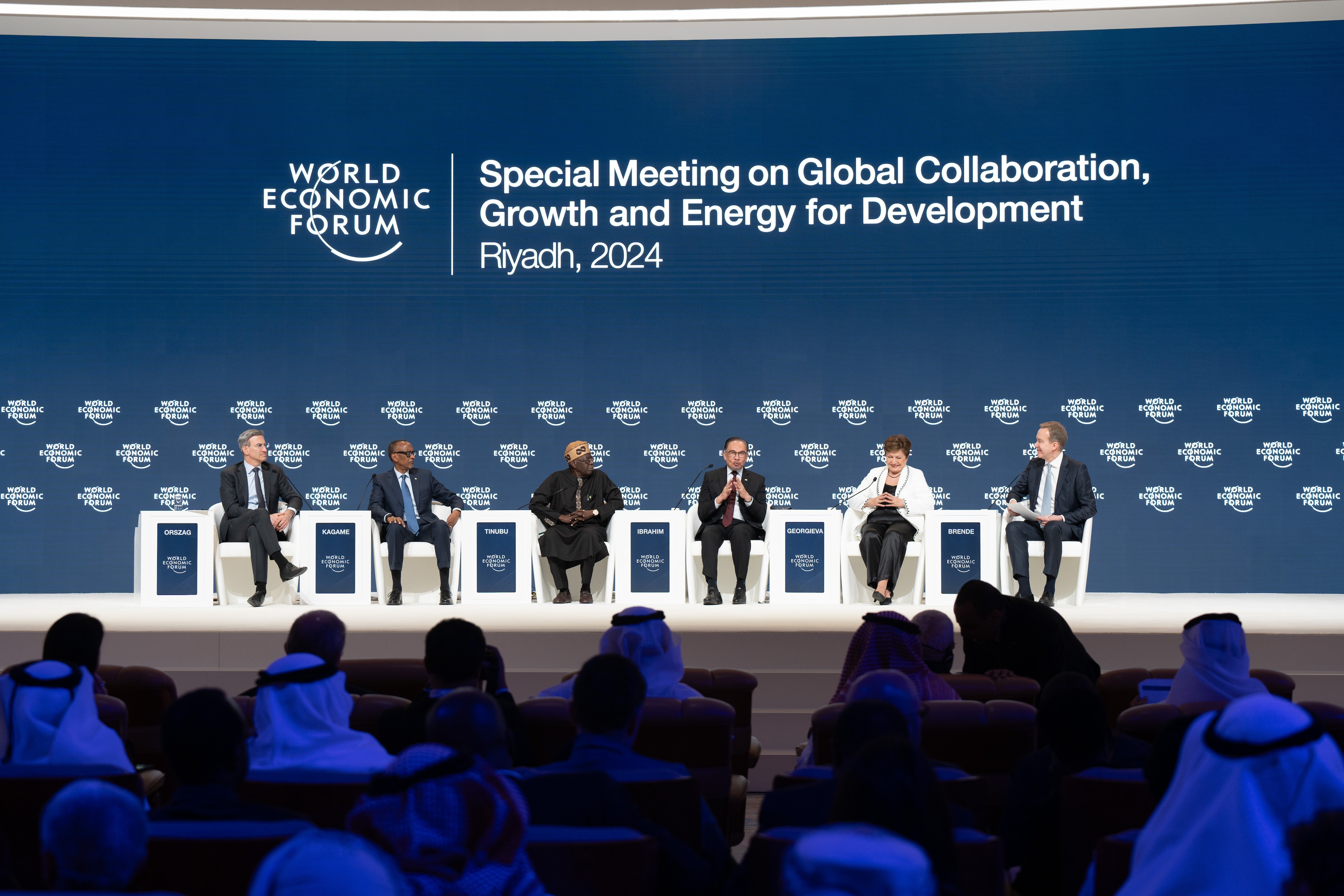European businesses must balance digital with sustainability. Here's how

Europe must accelerate its "twin transformers", such as L’Oréal that employs technology to ensure its palm oil is sustainable. Image: REUTERS/Luis Echeverria

Get involved with our crowdsourced digital platform to deliver impact at scale
Stay up to date:
The Digital Transformation of Business
- Companies need to weave digital transformation and sustainability into their DNA in order to survive.
- There is an urgency for European companies to step up their efforts to recover from COVID-19.
- Digital and sustainability complement each other and both need talent to fuel them.
There is a reason why DNA is a double helix. The spiralling structure of the molecule that is the basis of life is critical for replication, adaptation – and survival.
It is a powerful metaphor for business amid two parallel transitions twisting the laws of evolution in dynamic yet unstoppable ways – digital transformation and sustainability.
Only companies able to adapt to a rapidly changing landscape by harnessing and weaving these forces into their genetic code can ensure they will not become extinct.
This is particularly relevant to Europe, which stands at a crossroads as the world economy emerges from the COVID-19 pandemic and other regions hit the ground running.
How European companies manage this “twin transformation” – by unlocking the potential that derives from the interaction of both strands of this double helix, and powering it with the talent of their people – will determine their fate.
European businesses are at risk of lagging
Europe has good reason to focus on its evolution: COVID-19 has underlined the competitive challenges facing the continent.
The pandemic hit the world like a low punch pushing down GDP 4.2% in 2020, but while vaccination campaigns and state aid will buoy global growth by 4.2% this year, our surveys suggest executives are nervous about Europe’s recovery.
There is a sense that momentum has stalled: Accenture data suggests that European executives have less confidence in their ability to meet growth targets (45%) than peers in regions such as Asia-Pacific (60%).
The crisis has exposed big differences in resilience, with some companies watching revenues plummet and feeling bleak about prospects, and others remaining optimistic.
Executives from fewer than a third (32%) of European companies expect profitable growth in the next 12 months, yet although these will be tomorrow’s leaders, in APAC the equivalent figure is 41%.
While some European companies (4%) have managed to reinvent themselves and are doing even better than before the crisis – more are doing so in APAC (7%). Europe actually has more companies struggling to rebound, at 19%.
Twin transformation powered by people
Against this backdrop, Europeans must consider strategy.
In the 2010s the landscape was defined by digital transformation, with those companies able to undertake this at speed and scale gaining competitive advantages.
Now, business change is defined by the sustainability transition – something Europe, with its ambitious green plans, has understood.
However, transforming a business requires more than just improving either innovation or sustainability. What matters is something geneticists call “crosstalk” – their interaction.
Crosstalk never at cross purposes
Accenture data suggests that companies understanding crosstalk are three times more likely to be tomorrow’s leaders. Their resilience during the COVID-19 crisis will catapult them rapidly into a rebound.
“Twin transformers” are unique for several reasons.
Not only do they plough more into innovation – 45% are investing more than 10% of the annual revenue they did pre-COVID jumping to 57% over the next year – they also target initiatives combining sustainability impact and technology, and do so at scale.
Twin transformers create ownership of sustainability projects company-wide by assigning KPIs beyond financial results – tracking non-financial impacts on wellbeing, the environment and consumer experience and linking executive pay to impact.
They favour sustainability-driven ecosystem models, engage suppliers in their sustainability journeys, and have devout faith in home-grown talent.
These companies are tuned into the human dimension of transformation, too. Data indicates that Europe’s twin transformers believe failing to nurture their people will hamper digital and sustainable transformation. Thus, they take responsibility for the continued employability of their people.
They spare no effort in reskilling and upskilling their workforce, understanding that to turn transformation into material business value, building and nurturing talent is essential.

Europe has taken the plunge
At first sight, European companies are well placed for this twin transformation.
They score more highly in ESG ratings, and in their post-pandemic rebound and mid-term strategies their leaders are prioritising both technology adoption and sustainability.
There is also no doubt that investors are interested: in 2020 sustainability was a featured topic in far more European earnings calls than in other regions, and 53% of Europe’s top companies also discussed technology.
Before COVID-19, the Europeans trailed rivals on adoption of technologies like AI, cloud and 5G – but nearly 40% are now making large investments.
They are also collaborating across business, government and society to create an ambitious political climate for sustainable change while investing in green start-ups.
All this said, too few companies recognise the business synergy between technology and sustainability.
This helps to explain why only a fifth (22%) of European sustainability or technology pioneers are “twin transformers”, while in Asia more than a third (34%) are.
Data suggest Europeans are less motivated by sustainability business opportunities than rivals and less focused on the enabling power of technology.
And while 50% of Europe’s largest companies discuss sustainability and technology in earnings calls with investors, only 5% discuss both in conjunction.
Europe has the base
This blind spot is indeed strange, because the twin transformers Europe does have are household names.
Danish energy company Ørsted, for example, anticipated renewables in 2009 and flipped its portfolio to 75% green by 2018 using analytics, AI and the cloud.
French power group Schneider Electric created a global network of corporations to champion renewables and clean tech, and Danish bioscience company Christian Hansen is allocating 75% of R&D spend to natural nutrition supported by digital technologies.
German engineer Siemens uses simulation and digital twins to green its output, and French luxury goods group Kering has devised digital solutions to cut fashion’s environmental footprint.
French personal care company L’Oréal employs technology to ensure its palm oil is sustainable, and German delivery group Deutsche Post DHL’s GoGreenCarbon Dashboard helps consumers choose low-carbon shipping.
These companies stand at an evolutionary watershed confronting Europe with important choices.
Its businesses can continue down a well-trodden path while watching others gain a competitive edge by exploiting dynamic interactions at the heart of their DNA.
Or they can join them by unlocking the value that lies in blending innovative technology with Europe’s traditional strengths of sustainability, solidarity and purpose.
Accelerating “twin transformation” will be required to rebuild trust and drive a robust recovery – two key themes of The Davos Agenda.
Don't miss any update on this topic
Create a free account and access your personalized content collection with our latest publications and analyses.
License and Republishing
World Economic Forum articles may be republished in accordance with the Creative Commons Attribution-NonCommercial-NoDerivatives 4.0 International Public License, and in accordance with our Terms of Use.
The views expressed in this article are those of the author alone and not the World Economic Forum.
The Agenda Weekly
A weekly update of the most important issues driving the global agenda
You can unsubscribe at any time using the link in our emails. For more details, review our privacy policy.
More on Forum InstitutionalSee all
Gayle Markovitz
April 28, 2024
Gayle Markovitz
April 27, 2024
Mirek Dušek and Maroun Kairouz
April 27, 2024
Kate Whiting
April 26, 2024
Spencer Feingold and Gayle Markovitz
April 19, 2024
Kate Whiting
April 17, 2024






